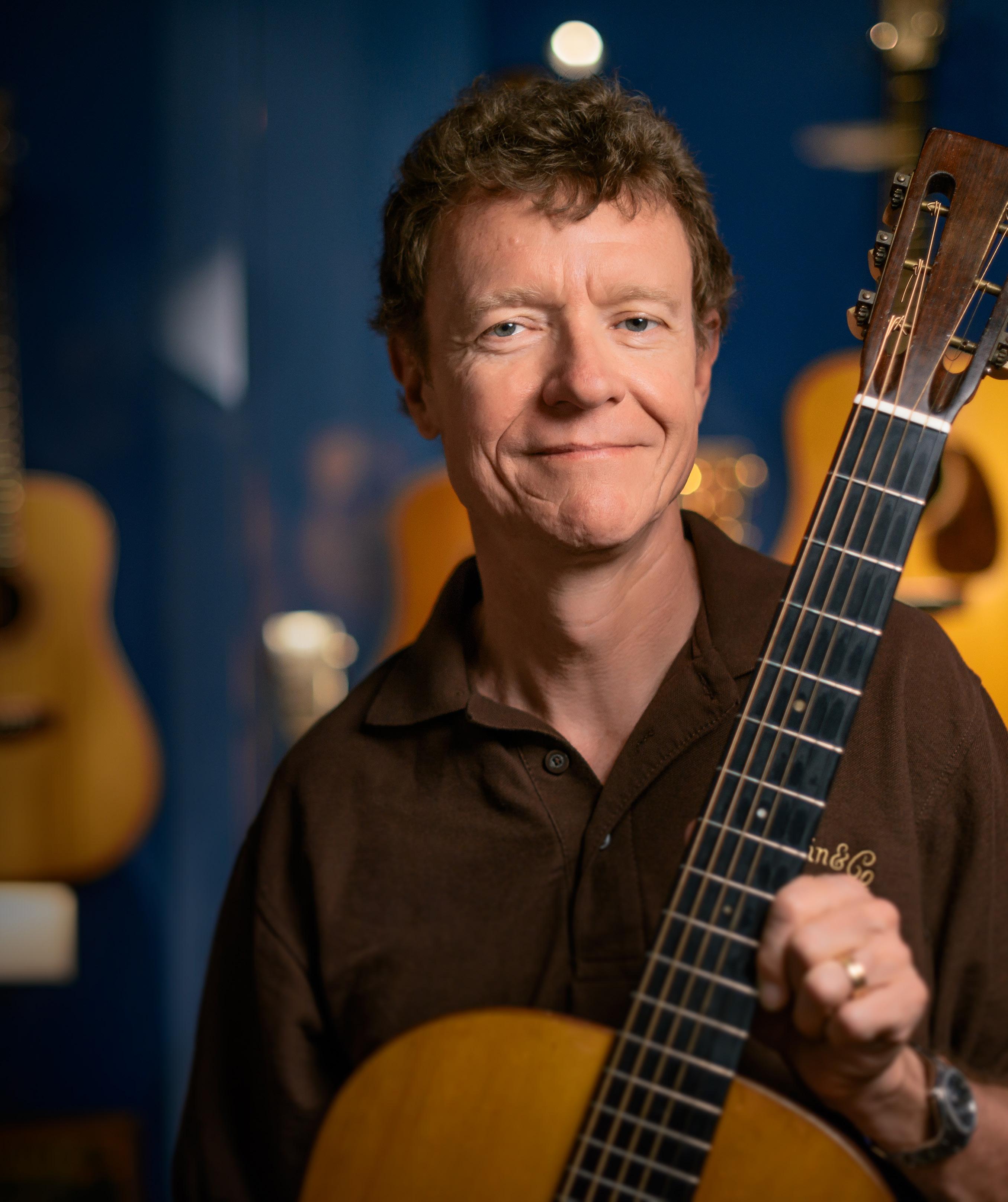
13 minute read
CHRIS MARTIN IV: A JOURNEY OF SIX GENERATIONS
from VESTED Winter 2021
by CAPTRUST
A Journey of Six Generations by Nanci Hellmich
When Chris Martin IV watches a musician playing the guitar on TV, he looks to see if it bears his company’s logo, C. F. Martin & Co. Even if it doesn’t, he still sees a silver lining. “I am so happy when I see someone playing the guitar. Any guitar. Someday they may play a Martin,” he says.
Advertisement
It’s that passion for the acoustic guitar industry that helped him steer the family-owned business through good times and bad for the past 34 years.
Martin, 65, is playing his swan song this summer, retiring as chief executive officer of Martin Guitar, as well as finishing his tenure as chair of the National Association of Music Merchants (NAMM).
His retirement will mark the end of six generations of Martin men running the 187-year-old Nazareth, Pennsylvania-based company, whose guitars have been played by Elvis Presley, Johnny Cash, Hank Williams, Paul McCartney, Eric Clapton, and Gene Autry.
Martin wanted to exit on a high note. “I have been talking about retirement for at least five years. My father retired under duress, and my grandfather forgot to retire,” he says. His father left the business after making some unsuccessful business decisions, while his grandfather ran the company until his death at age 91.
Martin Guitar’s board was “hoping I would work for the next 100 years. I knew I would get pushback about the decision. People said, ‘Are you sure? Don’t you want to wait a year?’ But I thought, ‘I don’t know what I’m waiting for.’”
He wants to focus on his family and health. He is receiving treatment for bladder cancer, and his wife, Diane, is being treated for breast cancer. He says they’re both thankful for the excellent medical care they’re receiving. “It’s the journey Diane and I are on now, and we want to prolong that journey because we have a teenage daughter.”
The company, which also makes guitar strings and ukuleles, is searching for a new leader, and for now, someone outside his family will run the business. But one day, another C. F. Martin, Martin’s daughter, Claire Frances, 16, might want to take over.
Martin has been talking to her about inheriting the business. “I told her, ‘You don’t have to run it, but you have to manage the people who run it. You are going to own it. You are going to have the opportunity to be chairman of the board.’”
In the meantime, he’ll remain chairman and assume a new role as executive chairman, working far fewer hours but still representing the company.
When the pandemic has subsided, he plans to travel to trade shows, distributors, and guitar stores around the world to share the company’s history. “People get a big kick out of me telling the story about my family business,” he says. “It’s not a video. It’s not a salesman telling the story. It’s a Martin telling the story.” MAKING A GUITAR
During his 34-year tenure as CEO of Martin Guitar, Chris Martin IV embraced modern guitar-making technology to make the company more efficient and productive and to reduce repetitive stress injuries among employees.
The original Martin instruments were handmade, but are now produced with the assistance of automation, including wood-carving equipment, robots, and other technology.
“Some of the high-end models are still handmade, but when you get down in price, we embrace automation,” Martin says. “We don’t have machines that put guitars together. Each guitar is still assembled by hand.”
Martin guitars range in price from $500 to $150,000 for a limited edition. “We don’t make $129 guitars,” Martin says. “That’s where the volume is, particularly around Christmas. That is your first guitar.”
Someone might start with an inexpensive instrument, but as they get more serious about playing, they upgrade, he says. “What seems to happen is when a guitar player decides to play the guitar as a career, they say, ‘I need a good tool.’ We are fortunate that they often choose to use a Martin guitar.”

Learning the Business
What a story it is.
Martin’s great-great-great-grandfather was German-born Christian Frederick Martin, the son of a cabinet maker who apprenticed with a renowned guitar maker. He immigrated to the U.S. in 1833 and founded the business.
“For whatever reason, God bless him, C. F. Martin learned how to make guitars, and he decided to make great ones,” Martin says.
Chris Martin IV’s path to CEO took several twists and turns. His mother and father divorced when he was three, and he lived with his mother in New Jersey, but he visited his grandparents, C. F. Martin III and Daisy, in Nazareth during the summer. “I would go to work with my grandfather and pack guitar strings and move wood around in the shop,” he says. “I never got to use a tool, but I got to be around the tools. That was my first exposure to the shop.”
During the summer between high school and college, he worked in the shop. “I followed a guitar through the guitar-making process and gained tremendous respect for my colleagues who do the work. I learned I’m a klutz when it comes to doing woodworking.”
He also didn’t have an affinity for playing the instrument. “I took guitar lessons as a kid,” he says, “but I didn’t click with the teacher, so I never learned to play, which is okay, because I am surrounded by great guitar players.”
After graduating in 1978 from Boston University with a bachelor’s degree in business, Martin joined the family business full-time.
His father, Frank Herbert Martin, struggled toward the end of his tenure as president of the company, so he retired, and his grandfather, C. F. Martin III, assumed control again. “My father and I had a bit of an estranged relationship,” Martin admits. “My grandfather saw my interest in the company and was a great mentor to me.”
His grandfather named him vice president of marketing in 1985. “It was a way for him to say to everyone else, ‘Chris is sticking around, and I want to give him a title that gives him a little bit of heft,”’ Martin says.
After his grandfather died in 1986, Martin was named chairman of the board and chief executive officer. He was 31 and scared to death. He didn’t consider himself a natural leader, and he faced several obstacles. “My father left a whole cadre of mostly male appointees his age who were looking at me a bit skeptically,” Martin says.
Another obstacle: At the time, the acoustic guitar industry was floundering. “Business was terrible,” Martin admits. “We went from making 23,000 guitars a year in the 1970s to 3,000 a year in the early 1980s. And we had some quality issues. It was little stuff that we needed to address.”
However, Martin’s vision and entrepreneurial spirit turned the business around, says Jackie Renner, president of Martin Guitar. “When the company had quality issues in the 1980s, he brought his manufacturing colleagues together and said, ‘What do we have to do to make this company vibrant again?’ The answer was focusing on the musician and making the highest-quality instruments possible,” Renner says.

Evolving Over Time
As the quality issues were resolved, something else happened to turn things around: MTV Unplugged made its debut in 1989, and by the early 1990s, the phone started ringing off the hook, Martin says.
“MTV recognized how cool the acoustic guitar was and promoted it to an audience that was a little jaded,” he says. “It didn’t start out wildly successful for us, but pretty soon, the momentum was building, and people said, ‘I have to get an acoustic guitar like the one Eric Clapton played on MTV.’ We paid attention at the time, and we got very lucky.”
Clapton was a fan of the guitar, saying, “If I could choose what to come back as, it would be a Martin OM-45.”
Martin built on that momentum by starting the Signature Series guitar line, featuring instruments played by acclaimed musicians such as Johnny Cash and Gene Autry.
“If you are famous and you agree to do an artist’s model, we will give you a guitar, and you can buy a few for your friends and family,” Martin says. “Then we give some of the proceeds from the other guitars we sell in that line to the artist’s favorite charity.”
The company has made 175 signature models since it launched the series in 1993.
During his time as CEO, Martin began profit sharing with his employees, offering college tuition reimbursement, and working on sustainability issues. “We use rare exotic timbers—rosewood, ebony, mahogany—for our products,” he explains. “We are trying to find a way to make the supply chain more sustainable.”
MTV recognized how cool the acoustic guitar was and promoted it to an audience that was a little jaded. It didn’t start out wildly successful for us, but pretty soon, the momentum was building, and people said, ‘I have to get an acoustic guitar like the one Eric Clapton played on MTV.’ We paid attention at ”the time, and we got very lucky. Chris Martin IV

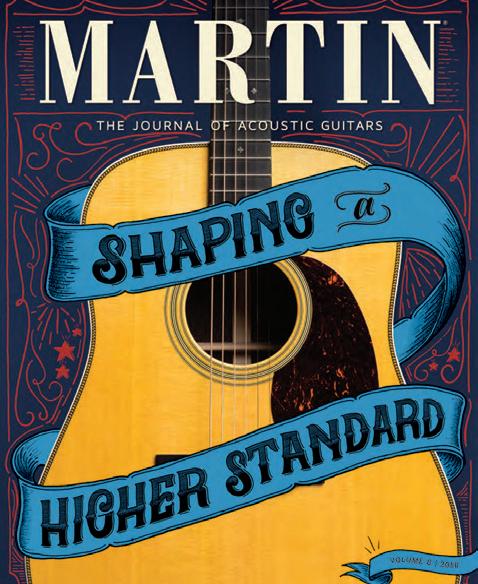

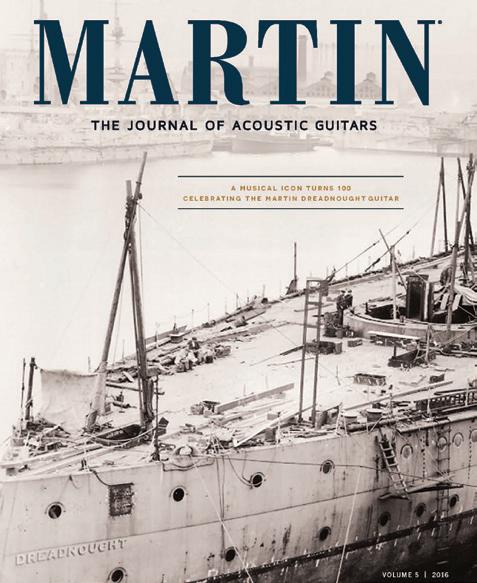
Courtesy of Martin Guitar
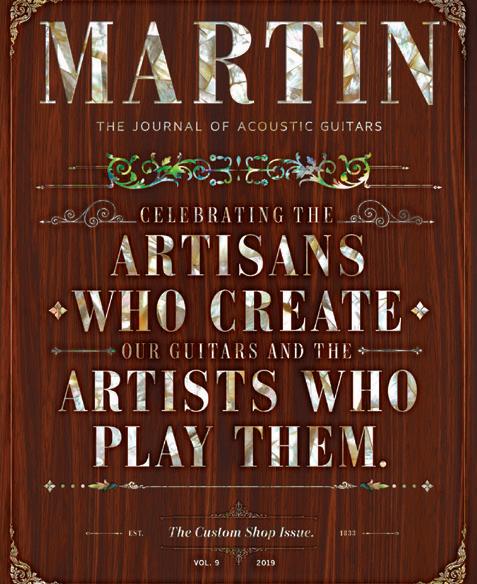

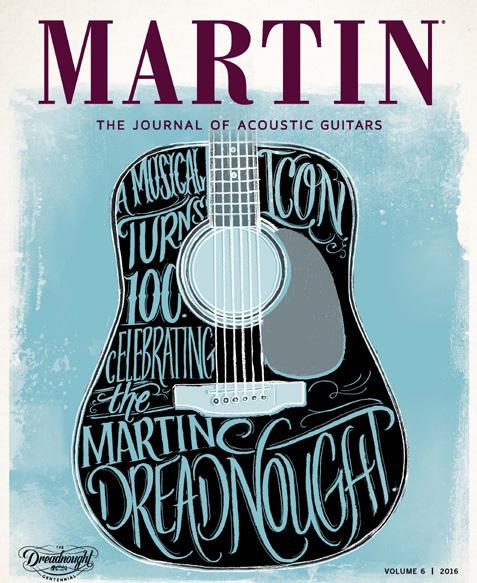

Renner says Martin has nurtured the culture of Martin Guitar, which employs about 1,000 people in its two factories—one in Nazareth and the other in Navojoa, Mexico. “He introduces himself to all of our new employees in Nazareth and takes them on a tour of our guitar museum to hear a little more about his family history. Chris is incredibly energetic, passionate, and committed to Martin Guitar,” she says.
Continuing to Contribute
As Martin winds down his role as CEO, he looks forward to what’s next and to reallocating his time to other causes. The first thing he wants to do in retirement is to take a breather. “I want to do nothing,” he says. “I’m test-driving that idea now during COVID.”
After the pandemic, he and his wife plan to travel more, and he wants to build a kit car, a Caterham, in his garage. “A bunch of crates will be arriving soon at my house from England. This kit is relatively simple. You hear stories that people buy a kit car, and it never gets done. I don’t want that to be me. With the help of some friends, I think I can get it on the road.” Attorney Chuck Peischl, a longtime friend and a member of the company’s board, says he’s glad that Martin will assume the role of executive chairman. “He really is Mr. Martin, just like his grandfather before him. He was the personification of the company, and Chris is in that same image mold.”
“One time, I asked Chris what he would be if he wasn’t CEO of Martin Guitar, and, without missing a beat, he said, ‘a philanthropist,’” Peischl says. He expects Martin will spend more time serving as chairman of the Martin Guitar Charitable Foundation, which gives money to charities in the community, such as food banks, as well as nonprofit music, arts, education, and environmental action organizations.
Martin says he’s grateful for his career in the music industry. “People are passionate about being part of this industry. Once people join it, they never leave it.”
But he’s especially grateful to have served as head of a company in which both employees and customers value a guitar that’s as good as it can be.
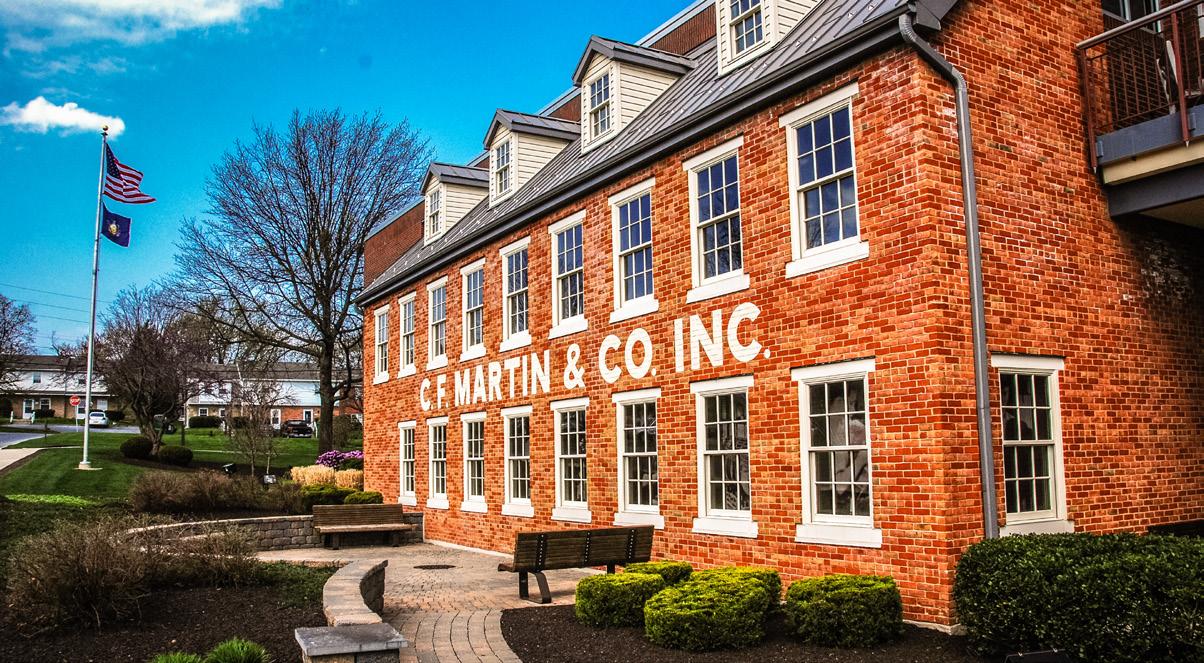
ABOUT MARTIN GUITARS
C. F. Martin & Co. has been inspiring musicians for nearly two centuries with its superior guitar and string products. Martin guitars and strings remain the choice for musicians around the world for their unrivaled quality, craftsmanship, and tone. Throughout the company’s long history, Martin products can be seen and heard across all genres of music and in all segments of pop culture, from concert and theater stages to television and movies.
With an unwavering commitment to environmental sustainability and responsible manufacturing practices, Martin continually drives the acoustic guitar market forward, introducing innovative features that have become standards across the industry. These groundbreaking innovations include the introduction of X-bracing, the 14-fret guitar, and the dreadnought-size guitar. Martin has also led innovations in strings, such as introducing the first high-tensile strength steel-string core wire; the first nickel acoustic strings (Martin Retro®); the proprietary Titanium Core strings; and now the groundbreaking, new Authentic Acoustic line, which offers unmatched stability, tone, comfort, and longevity.
510 Sycamore St., Nazareth, PA 18064 610.759.2837 | martinguitar.com

A FAMILY BUSINESS
The history of Nazareth-based C. F. Martin & Co. is a long and illustrious family story centered around some of the finest guitar craftsmanship in the world. The brand has transcended generations as a who’s who among famous players and musical royalty. Take a look over our notes on the big markers for the Martin family and for C. F. Martin & Co. over the last 200 years.
1825
C. F. Martin Jr. is born.
1839
C. F. Martin Sr. moves his family to Bushkill Township, Pennsylvania, to a piece of land now occupied by the C. F. Martin & Co. factory.
1866
Frank Henry Martin is born.
1894
C. F. Martin III is born.
1916
C. F. Martin & Co. makes the first full-size dreadnought guitars.
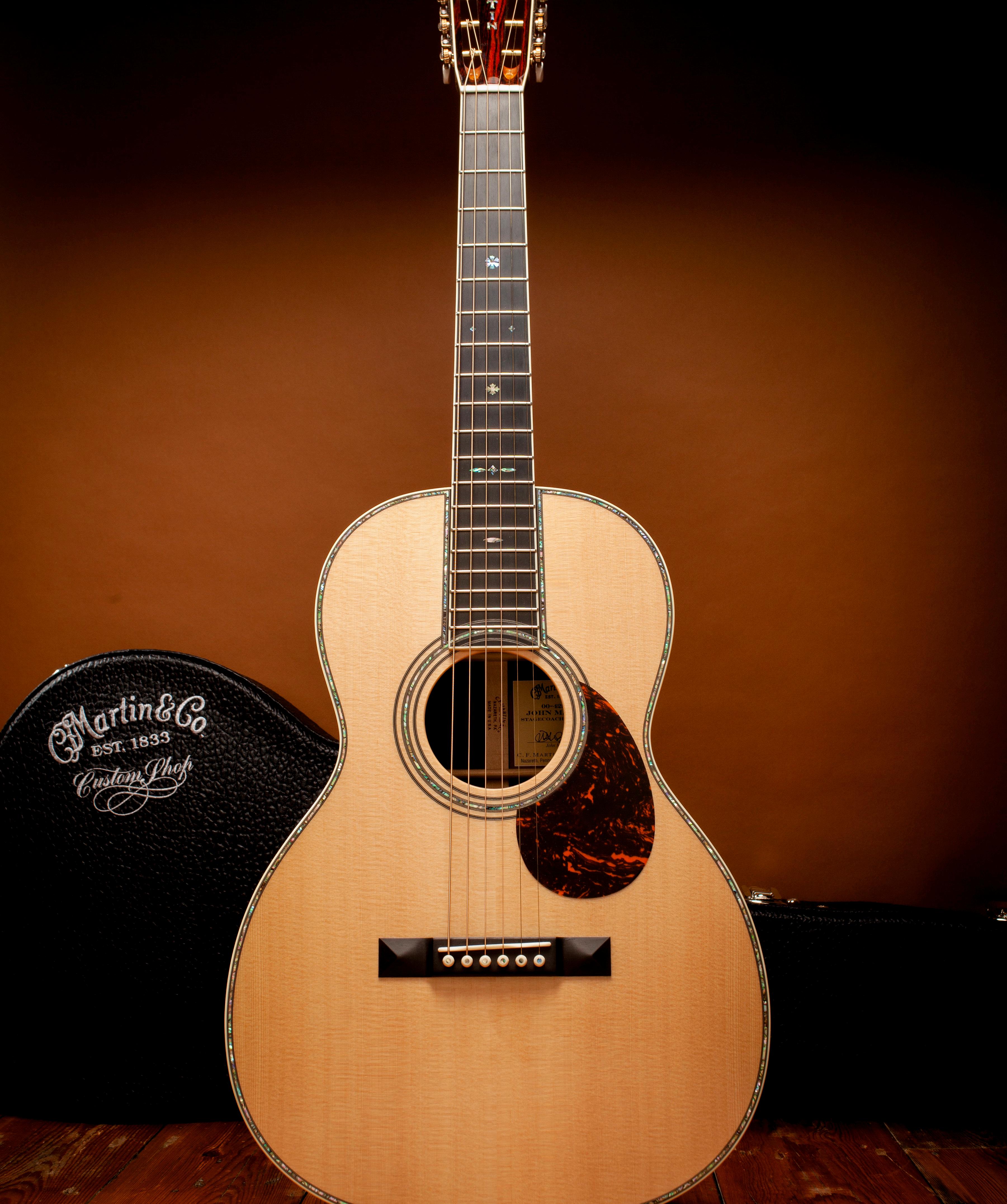
1945
C. F. Martin III assumes the presidency of the company.
1955
C. F. Martin IV is born.
1986
C. F. Martin IV is appointed chairman of the board and chief executive officer.
1999
C. F. Martin & Co. nearly doubles its factory size, employing more than 600 people.
2005
The company announces the opening of a new Martin Guitar Museum and Visitors Center. 1811
Christian Frederick Martin Sr. leaves his hometown at age 15 for Vienna, Austria, to work for Johann Stauffer, a well-known guitar maker.
1833
C. F. Martin Sr. gathers his family and heads to New York to form C. F. Martin & Co.
1842
C. F. Martin Sr. invents the first Size 1 model and earliest X-braced guitar ever documented.
1888
The company is passed to the son of C. F. Martin Jr., Frank Henry Martin, and his mother.
1940s
Hank Williams, Ernest Tubb, Lester Flatt, Hank Snow, and Kitty Wells all show up on stage with Martins.
1954
Elvis Presley bursts on to the music scene playing his 1942 D-18.
1980
Neiman Marcus features a gold- and pearl-laden D-45 Custom Martin Guitar in its Christmas catalog.
1992
Eric Clapton plays two Martins on MTV Unplugged.
2017
Martin made its two millionth guitar. 2004
C. F. Martin & Co. makes its one millionth guitar.

